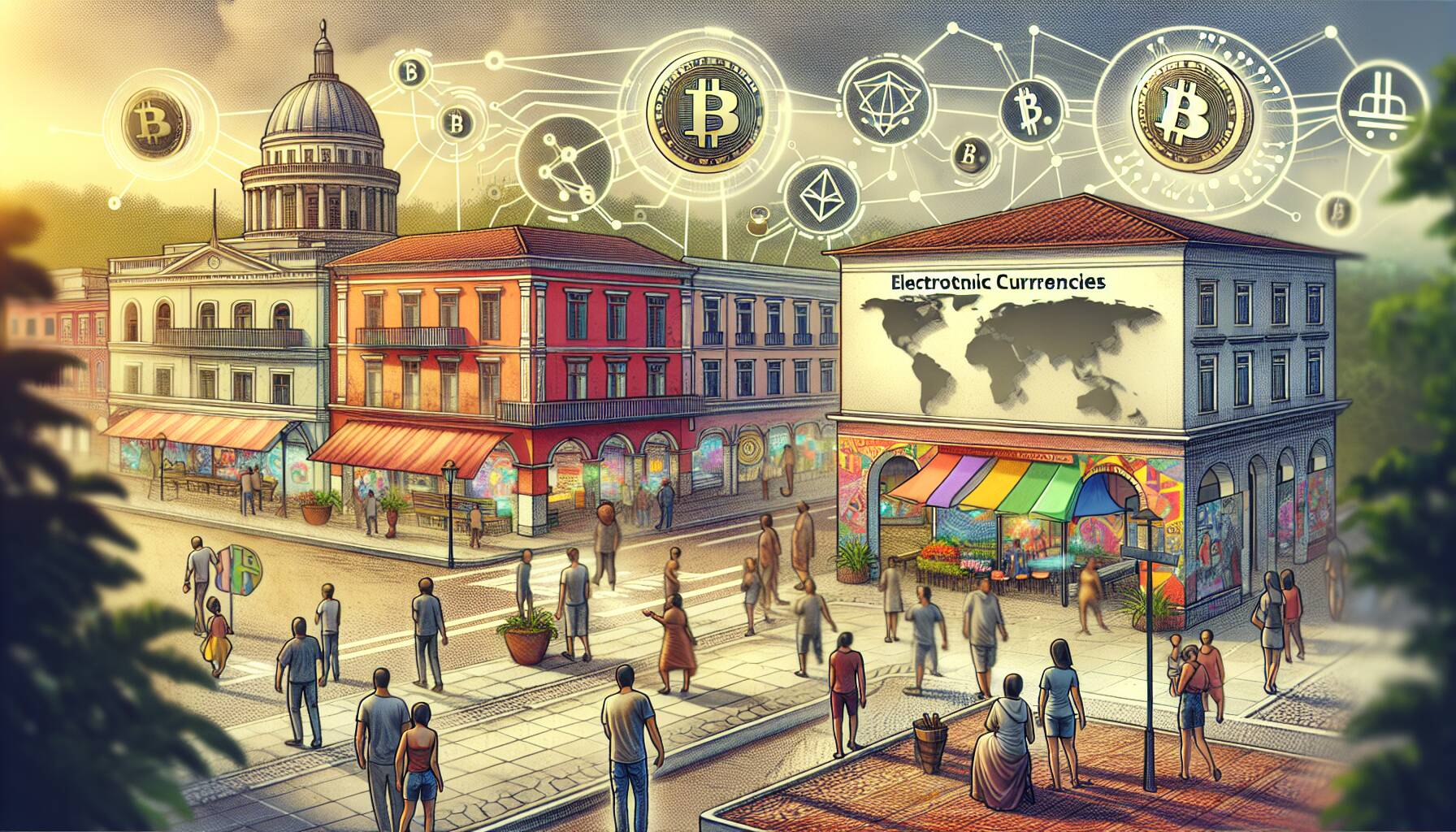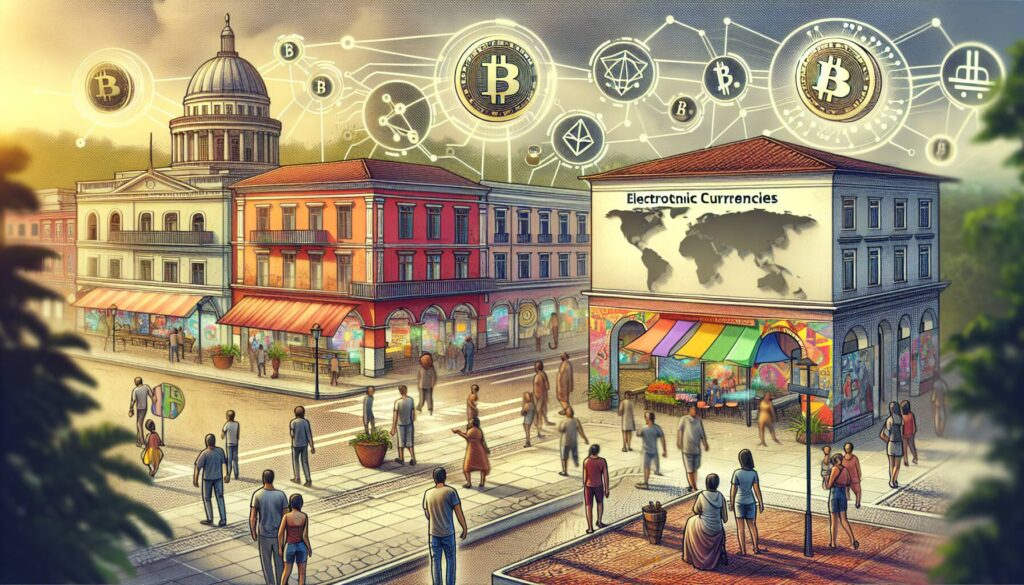In the picturesque mountains of El Salvador lies the town of Berlín, a hidden gem that has quietly cultivated one of the largest Bitcoin circular economies globally. Just two hours from the bustling capital, this mid-sized community of around 20,000 residents has embraced cryptocurrency in a way that stands in stark contrast to the broader trends observed throughout the country since Bitcoin was declared legal tender in 2021.
Unlike the more famous Bitcoin Beach in El Zonte, Berlín’s story is marked by local engagement rather than international tourism appeal. While critics have been quick to declare El Salvador’s Bitcoin experiment a failure, with a staggering 88% of the population reportedly not using the cryptocurrency as of 2023, Berlín shines as a beacon of grassroots adoption. Here, everyday Salvadorans are using Bitcoin to pay for essentials, from groceries to services, indicating a level of financial independence and community interest that is noteworthy.
At the heart of this movement is the Bitcoin Community Center, a multifunctional hub where residents gather to learn and share knowledge about Bitcoin. With over 150 businesses in Berlín accepting Bitcoin—about 25% of all local enterprises—adoption is significantly growing. The community center fosters not just economic transactions but also educational programs and social initiatives, uniquely positioning Berlín as a place where cryptocurrency technology has become embedded in daily life.
The journey to Bitcoin acceptance in Berlín wasn’t without challenges. Initial skepticism regarding the cryptocurrency’s viability was common, stemming primarily from past government initiatives that failed to gain traction. However, the community’s resilience and collective effort led to a transformation in mindset. Longtime residents, such as Patricia Rosales and her collaborative team, played key roles in promoting Bitcoin, demonstrating a communal spirit that resonates throughout this vibrant town.
“With Bitcoin, there are no controls,” shares local lawyer Marisol Reyes, reflecting the desire for autonomy that many Berliner residents feel in managing their finances.
This flourishing Bitcoin culture reflects Berlín’s rich history and the locals’ determination to not wait for governmental solutions. As Berlín continues to thrive as a Bitcoin hub, it stands as a testament to innovation rooted in community resilience, pulling the future of finance into a more localized context and showcasing the potential for cryptocurrency beyond mere speculation.

Berlín: A Hidden Bitcoin Haven in El Salvador
Berlín, a town in El Salvador, showcases an intriguing case of Bitcoin adoption among locals, standing as a unique example in a country where widespread adoption has been challenging. Here are the key points:
- Location and Community:
- Mid-sized town with a population of 20,000, two hours from the capital.
- Offers essential services like banks and clinics, along with a robust local economy.
- Possesses one of the largest Bitcoin circular economies globally, with about 25% of businesses accepting BTC.
- Bitcoin Acceptance:
- Unlike other towns, locals actively use Bitcoin for daily transactions beyond attracting tourists.
- Beginning of a Bitcoin community initiated post-2021, post the legalization of Bitcoin by President Bukele.
- Initial skepticism from the population led to gradual adoption as locals started recognizing its benefits.
- Community Initiatives:
- The Bitcoin Community Center serves as a hub for education, training, and social events related to Bitcoin.
- Informal learning and training sessions empower local business owners to adopt Bitcoin in their operations.
- Projects began focusing on community development, such as street cleaning and park renovations, alongside Bitcoin education.
- Economic Impact:
- Beacon of hope for residents who previously had no access to banking services, stimulating economic growth.
- Encouragement for foreign tourism has led to increased economic activity in the town.
- Local businesses report improved transaction efficiency and reduced costs compared to traditional banking.
- Cultural Shift:
- The innovative use of Bitcoin fosters community connections and social interaction beyond mere financial transactions.
- Residents, previously wary of Bitcoin due to its association with government policies, now begin to appreciate its practical uses.
- Community resilience born from historical conflicts encourages proactive adaptation to new financial tools like Bitcoin.
“With Bitcoin, there are no controls.” – Marisol Reyes, local lawyer
Berlín: The Unsung Hero of Bitcoin Adoption in El Salvador
The picturesque town of Berlín in El Salvador presents an intriguing case study in Bitcoin adoption—a stark contrast to the widely publicized narrative around other locations like El Zonte, which has been lauded for its vibrant tourism. Berlín’s blossoming circular economy showcases how local communities can gradually embrace cryptocurrency outside the glare of sensationalism and tourism. While the bustling surf town of El Zonte captures the attention of curious travelers, Berlín focuses on community-driven adoption. This emphasizes a critical advantage: economic sustainability initiated by local residents themselves, rather than an influx of tourist dollars.
Berlín’s unique approach to Bitcoin adoption shines against a backdrop of broader skepticism toward President Nayib Bukele’s cryptocurrency policies. Although the government pushed for national-level Bitcoin integration, surveys indicate that a significant portion of the Salvadoran population remains unconvinced. In contrast, Berlín offers a refreshing narrative where locals engage with Bitcoin organically, seeing its merit not just as a speculative investment but as a practical solution to daily financial transactions. Such grassroots momentum presents competitive advantages by fostering community trust and local business cooperation over reliance on governmental mandates.
However, this localized Bitcoin experiment is not without its challenges. Berlín still faces skepticism due to the public relations fallout from the government’s previous initiatives—particularly the notorious Chivo wallet, which was plagued with operational issues. This legacy makes potential Bitcoin users cautious, as seen in a local construction worker’s hesitation to embrace cryptocurrency due to notions of complexity and lack of savings. While this sets Berlín’s innovative efforts back slightly, it also positions the town as a potential model for peer-to-peer financial solutions devoid of governmental oversight, appealing to those wary of centralized control.
The implications of Berlín’s example extend to both local and international circles. For Salvadorans disillusioned by top-down mandates, Berlín provides a community-centric alternative, creating opportunities for genuine engagement with Bitcoin technology. It empowers the local populace to reclaim agency over their financial transactions, fostering self-sufficiency. However, for foreign investors and tourism operators drawn by the allure of an up-and-coming Bitcoin haven, Berlín’s slower adoption rate compared to El Zonte might muddle their expectations for quick profits or guaranteed returns.
Ultimately, Berlín serves as both a beacon of potential for Bitcoin proponents eager to explore decentralized financial systems and a cautionary tale for those enticed by the prospect of rapid lifestyle changes based on a single currency. Its significant yet gradual acceptance provides an interesting focal point in the narrative around cryptocurrency, advocating for thoughtful integration within local cultures rather than mere transactional convenience.
















